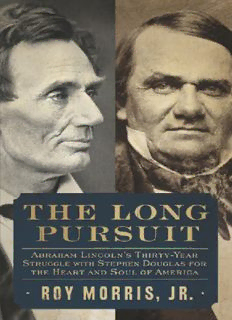
The Long Pursuit: Abraham Lincoln's Thirty-Year Struggle with Stephen Douglas for the Heart and Soul of America PDF
Preview The Long Pursuit: Abraham Lincoln's Thirty-Year Struggle with Stephen Douglas for the Heart and Soul of America
The L O N G P U R S U I T Abraham Lincoln’s Thirty-Year Struggle with Stephen Douglas for the Heart and Soul of America ] ROY MORRIS, JR. To Leslie, Lucy, and Phil— Three facets, one diamond. Contents Introduction vii 1 The Paradise of the World 1 2 Whigs and Polkats 29 3 A Hell of a Storm 53 4 Defiant Recreancy 79 5 Thunder Tones 105 6 Gentlemen of the South, You Mistake Us 131 7 The Rush of a Great Wind 153 8 The Prairies Are on Fire 175 9 We Must Not Be Enemies 197 Acknowledgments 219 Notes 221 Bibliography 237 Index 243 About the Author Other Books by Roy Morris, Jr. Credits Cover Copyright About the Publisher Introduction O ne stands today as perhaps the most revered figure in American history. The other is remembered, if at all, for a hard-fought election victory that most people believe mistakenly was a defeat. The gap between the two could scarcely be wider. Yet for much, indeed most, of their careers, Abraham Lincoln and Stephen Douglas held vastly different positions in the eyes of their countrymen. For the better part of two decades, Douglas was the most famous and controversial politician in the United States, renowned for his defeats as well as his victories, a “steam engine in britches” who worked tirelessly and combatively for the Democratic Party and, not incidentally, for himself. Lincoln was merely Douglas’s most persistent rival within their adopted home state of Illinois. A leader in both the House of Representatives and the Senate, Douglas was nearly nominated for president twice in the 1850s. Lincoln served a single undistinguished term in the House, one that he freely admitted was “a flat failure.” It was not until Douglas passed, almost single-handedly, the Kansas-Nebraska Act of 1854, ushering in half a decade of unprecedented civil strife in Kansas, that Lincoln reentered politics and began his inexorable and seemingly inevitable rise to the White House. Had it not been for Douglas, Lincoln would have remained merely a good trial lawyer in Springfield, Illinois, known Introduction locally for his droll sense of humor, bad jokes, and slightly nutty wife. Nationally, he was barely known at all. If, as Lincoln said, there was a “race of ambition” between the two men, until 1860 Douglas not only led the race, he virtually lapped Lincoln in the backstretch. While Douglas had little need for Lincoln, Lincoln badly needed Douglas, both personally and politically, as a goad, a pace horse, and a measuring stick. When Lincoln’s law partner, William Herndon, re- marked famously that Lincoln’s ambition was “a little engine that knew no rest,” he might well have added that it was the portly, combative figure of Stephen Douglas who stoked the engine. It is doubtful that Douglas, who had many rivals, ever fully realized how intensely Lincoln studied, plotted, and mulled over Douglas’s every move. He had the time. While Douglas strolled the marble halls of Congress, trailing friends and foes behind him in a cloud of smoke from his ever-present Cuban cigar, Lincoln trudged the muddy streets of Springfield alone and climbed the back stairs to his paper-strewn law office on the second floor above a haberdashery. His one link to the outside world was the stack of out-of-town newspapers that he read each morning as avidly as a marooned sailor reads strange footprints on a beach. Whenever Douglas returned to Illinois—and it was more and more infrequently—Lincoln was usually on hand to hear what he had to say and to respond, invited or not, to his remarks. In his shambling, slightly hangdog way, Lincoln functioned as a one-man truth squad for Douglas’s often flexible public pronouncements. Inherently honest himself (although not entirely immune from the professional politician’s constant temptation to stretch the truth as far as it might credibly stretch), Lincoln watched Douglas perform his regular philosophical about-faces with a cer- tain degree of amused wonder, if not necessarily admiration. Douglas, he said, did not “tell as many lies as some men I have known, but I think he cares as little for the truth . . . as any man I ever saw.”1 Like all ambitious politicians growing up in America in the 1830s, Lincoln and Douglas entered public life in the overbranching shadow of Andrew Jackson, and each man defined his political philosophy by how strongly he supported or opposed Jacksonian democracy. From boyhood, Douglas imbibed the heady brew of street-level, common-man poli- tics as embodied by the far from common figure of “Andy” Jackson— commanding general, plantation (and slave) owner, and natural-born elitist. It was a tenet of faith with Douglas that the voice of the people spoke most loudly and clearly when it bubbled up naturally from below. viii
Description: